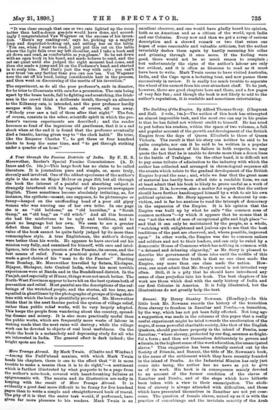The Building of the Empire. By Alfred Thomas Story. (Chapman
and Hall. 2 vole., 14s.)—The author of this book has attempted an almost impossible task, and the most one can say in his praise is that he has failed not without credit to himself. He has tried to put before his readers, within the space of two volumes, a full and popular account of the growth and development of the British Empire from the days of Queen Elizabeth to those of Queen Victoria. The result is that his story can neither be said to be quite complete, nor can it be said to be written in a popular form. As an instance of his failure in both respects, we may quote the fact that he is unable to devote more than a dozen lines to the battle of Trafalgar. On the other hand, it is difficult not to pay some tribute of admiration to the industry with which the author has collected and arranged in chronological sequence all the events which relate to the gradual development of the British Empire beyond the seas ; and, while we fear that the great mass of material has hardly been sifted into a readable form, we can at least admit that his book is likely to prove useful as a work of reference. It is, however, also a matter for regret that the author should have further handicapped himself by a wish to air his own political opinions. Mr. Story appears to be a democrat by con- viction, and is far too anxious to read the triumph of democracy in the expansion of the Empire. It is his opinion that the Empire was built up by what he calls " the common sons of common mothers "—by which it appears that he means that it was " not the work of men of exceptional gifts and high place "- and that it can only be maintained by the people, as a whole, "watching with enlightened and jealous eye to see that the best traditions of the past are observed, and, where possible, improved upon." In other words, the Empire was due to common sailors and soldiers and not to their leaders, and can only be ruled by a democratic House of Commons which has nothing in common with "a debased and debasing oligarchy," as Mr. Story is pleased to describe the government of these isles until the middle of this century. Of course the truth is that no one class made the Empire, any more than one class made the nation. How- ever, one must admit that Mr. Story's moral is not intruded very often. Still, it is a pity that he should have introduced any sense of class prejudice into his book. The best chapters of his work are those which deal with the early history of India and our first Colonies in America. It is fully illustrated, but the illustrations do not greatly help the text.


































 Previous page
Previous page